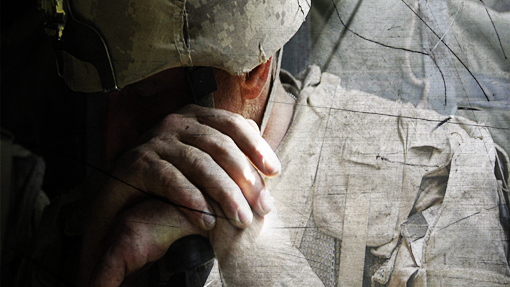
By Kelly Patricia O’Meara
To help soldiers take a different, more compassionate tack and begin to heal from the psychological ravages of war, Afghanistan veteran Lyle is looking for Congressional support to fast-track legislation that will, among other things, expand the definition of “service dog” to include those who suffer from PTSD, institute minimum training standards for the dogs and create a final test to qualify a successfully trained dog by the same group of PTSD dog training experts who create the minimum standards.
Lyle’s service dog, Kaya, has made all the difference in his recovery from PTSD and, according to Lyle, “I can say unequivocally and without contradiction that I probably wouldn’t be here if I hadn’t gotten Kaya.” Rather than dulling the senses that come with mind-altering drugs, Lyle’s service dog provides constant hands-on treatment, specially trained to acknowledge Lyle’s psychological triggers of PTSD and respond accordingly.
 With one in six American service members taking at least one psychiatric drug, including antidepressants, sedatives, antipsychotics and anti-anxiety medications, veterans taking their lives at a rate of 22 per day, and nearly 140,000 service men and women diagnosed with PTSD, compassionate, alternative treatments to the massive drugging of the American soldier and veterans cannot come soon enough.
With one in six American service members taking at least one psychiatric drug, including antidepressants, sedatives, antipsychotics and anti-anxiety medications, veterans taking their lives at a rate of 22 per day, and nearly 140,000 service men and women diagnosed with PTSD, compassionate, alternative treatments to the massive drugging of the American soldier and veterans cannot come soon enough.
Perhaps it is nurse and former U.S. Air Force Captain, Joyce Riley, who best sums up the kind of care that is expected from a grateful nation: “I want these troops to know that there are people that do care. And I want them to know that we are continuing to say the truth regarding these drugs and to say it needs to stop. They need to be treated appropriately. And they need to be treated as human beings, no experimentation, and no abuse that has gone on from the psychiatric community in this fashion. I want to see these troops given the respect that they deserve and they deserve it so very much.”
Riley, like so many others, including Lyle, is all too aware of the failed psychiatric drug “treatments” being forced upon the nation’s active duty military and veterans and the need for alternative care. The psychiatric drug data are extraordinary.
- Since 2010, more U.S. soldiers died by suicide than from traffic accidents, heart disease, cancer and homicide.
- Veterans are taking their lives at a rate of one every 65 minutes.
- In 2012, alone, there were 349 suicides among active duty military personnel—more than were killed in combat in Iraq and Afghanistan.
- From 2008-2011, military suicides were nearly double the number of suicides for the general U.S. population, with the military averaging 20.49 suicides per 100,000, compared to a general rate of 12.07 suicides per 100,000.
- The Department of Defense Suicide Event Reports (DoDSERs) for 2012 reported that the Armed Forces Medical Examiner System (AFMES) found that as of 31 March 2013, there were 319 suicides among Active component Service members and 203 among Reserve component Services members.
- Between 2005 and 2011, the military increased its prescriptions of psychoactive drugs (antipsychotics, sedatives, stimulants and mood stabilizers) by almost 700 percent.
- Prescriptions written specifically for antipsychotic drugs for active-duty troops increased 1,083 percent from 2005-2011, compared to prescriptions in the civilian population increasing just 22 percent.
- In 2014 the Veterans Administration’s mental health budget soared to nearly $7 billion from less than $3 billion in 2007.
- The U.S. Department of Defense and Veterans Administration have spent nearly $2 billion on antipsychotics and anti-anxiety drugs alone from 2001 to 2012.

Along with the above data are the numerous drug warnings, including 22 international psychiatric drug warnings citing effects of mania, hostility, violence and even homicidal ideation.
More telling, though, is the Food and Drug Administration’s (FDA) MedWatch system on psychiatric drugs revealing that between 2004 and 2012, there have been nearly 15,000 reports on psychiatric drugs causing violent side effects, including: 1,531 cases of homicidal ideation/homicide, 3,287 cases of mania and 8,219 cases of aggression.
The Citizens Commission on Human Rights (CCHR) is a mental health watchdog, which began routinely reporting on the drugging of America’s active duty troops and veterans in 2010, making military personnel aware of the dangers associated with psychiatric drug “treatments,” with Dr. Fred A. Baughman’s research into the questionable deaths of returning veterans who died in their sleep. Baughman found a common link – the antipsychotic Seroquel – known today by service members as “Serokill,” widely prescribed to returning troops for the non-FDA approved purposes such as insomnia.
CCHR also reported on each of the increasing number of violent acts committed by military personnel who had been prescribed psychiatric drugs, including Washington Navy Yard shooter, Aaron Alexis (antidepressant, Trazadone), Ft. Hood shooter, Ivan Lopez (Ambien, antidepressants and other drugs to treat anxiety and depression), and Bradley Stone (antidepressant Trazadone, antipsychotic, Risperidone among other drugs found in his system).
Continuing its commitment to providing accurate information to veterans and military personnel about the known adverse effects of psychiatric “treatments,” CCHR released in May of 2014 the documentary, The Hidden Enemy, a comprehensive expose on psychiatry’s use of military personnel worldwide as guinea pigs, subjecting soldiers to devastating psychiatric experiments.
At the same time, CCHR submitted to Jeff Miller, Chairman of the House Committee on Veteran’s Affairs, a petition seeking an investigation into the role of psychiatric drugs in military suicides and sudden deaths.
CCHR heartedly supports Lyle’s PAWS Act initiative and encourages Congress to act quickly on this unique, compassionate and very personalized treatment option. To support Lyle and other veterans looking for alternatives to psychiatric drug “treatments,” sign Lyle’s petition and contact your Members of Congress at Pawsact.com.
Kelly Patricia O’Meara is an award-winning former investigative reporter for the Washington Times’ Insight Magazine, penning dozens of articles exposing the fraud of psychiatric diagnosis and the dangers of the psychiatric drugs—including her ground-breaking 1999 cover story, “Guns & Doses,” exposing the link between psychiatric drugs and acts of senseless violence. She is also the author of the highly acclaimed book, Psyched Out: How Psychiatry Sells Mental Illness and Pushes Pills that Kill. Prior to working as an investigative journalist, O’Meara spent sixteen years on Capitol Hill as a congressional staffer to four Members of Congress. She holds a B.S. in Political Science from the University of Maryland.
All content herein is owned by author exclusively. Expressed opinions are NOT necessarily the views of VNR, authors, affiliates, advertisers, sponsors, partners, technicians, or VT Network. Some content may be satirical in nature.
All images within are full responsibility of the author and NOT VNR.
Read Full Policy Notice - Comment Policy






























There is another proven heart centered way to deal with Veterans with PTSD ~ see http://www.veteranstoday.com/2015/11/24/concord-vet-center-paves-way-for-needed-heart-centered-approach-to-vet-rehabilitation
“compassionate, alternative treatments to the massive drugging of the American soldier and veterans cannot come soon enough” ….Precisely true, see http://www.veteranstoday.com/2015/11/24/concord-vet-center-paves-way-for-needed-heart-centered-approach-to-vet-rehabilitation/
Comments are closed.